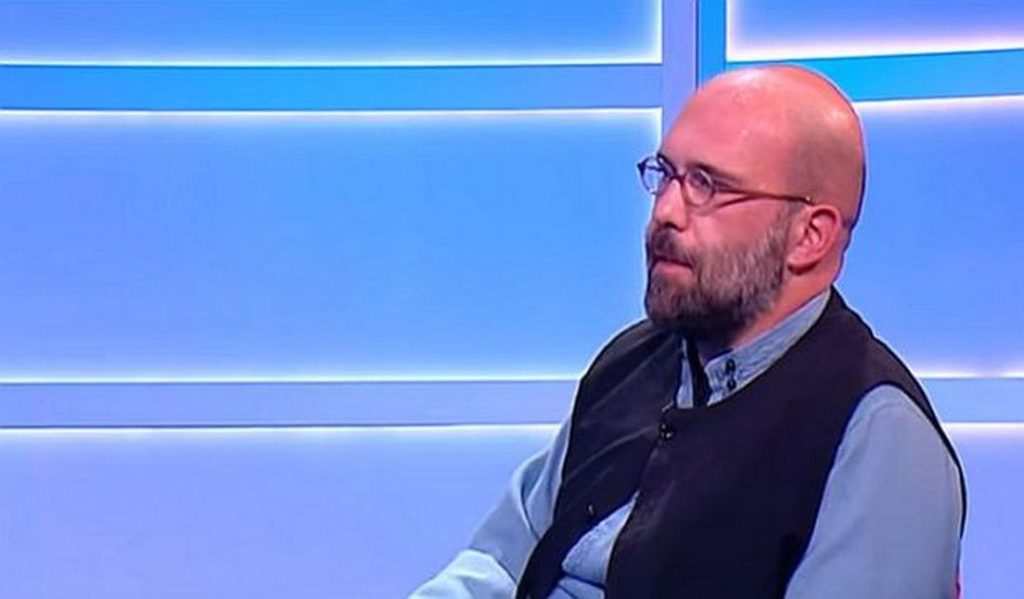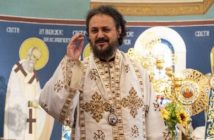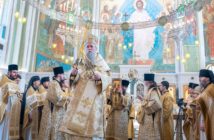Source: Public Orthodoxy

Dr. Vukašin Milićević
When, in March 2020, Serbian Patriarch Irinej officially sanctioned Dr. Vukašin Milićević, a priest and assistant professor of the Faculty of Orthodox Theology (FOT) at the University of Belgrade, it became clear that the recent interference of higher clergy of the Serbian Orthodox Church (SPC) in public speech matters gradually evolved into monopolizing the freedom of expression of its clergy with regard to almost all relevant issues, including science. The Patriarch remarked that Prof. Milićević—by his unannounced appearance in the TV broadcast Utisak nedelje—expressed disobedience to him personally, that he neglected the Constitution of the SPC and compromised the decisions of the Holy Council of Bishops that are binding for all clerics and prelates. Dr. Milićević belongs to a group of younger Orthodox theologians who openly tackle the problems within SPC and at the FOT. He is a co-signer of the 2017 public statement that came as a reaction to the petition of Serbian creationists, claiming that there were no plausible alternative scientific theories that could replace the theory of evolution. This includes the “biblical creation theory,” which, in these theologians’ view, is not a scientific alternative to the theory of evolution. The statement was openly criticized within the SPC, while some of the theologians who signed it were invited to explain their views before the Holy Council of Bishops at one of its May 2017 sessions. Soon after, several priest-professors from the FOT were deprived of their main parish duties and were only allowed to assist in liturgies. By the Patriarch’s immediate decision, they were let go from the editorial boards in the church electronic and print media. All this was accompanied by a warning that whoever violated this rule should be sanctioned in a church-disciplinary process.
It seems that this was only an announcement of the more serious measures against the “rebellious” Orthodox theologians. At the most recent Holy Synod session, held on August 26, 2020, Bishop Irinej Bulović requested the Synod withdraw blessings to three professors of the FOT: Rodoljub Kubat, Dragomir Sando, and Vukašin Milićević. Considering that the Synod still has a decisive role in the faculty position matters, Bulović was willing to punish three professors, but he was “vetoed” by another member of the Synod, Metropolitan Hrizostom. This is how Professor Kubat comments actions of the Synod for the Serbian media: “No one invited us to talk, and this is something basic. I wonder if this is a reprisal for my statement given at the portal Nova.rs, where I questioned the legitimacy of Bishop Irinej’s position at our Faculty? Or perhaps the possible reason might be that we submitted a petition to the [University of Belgrade] council of professional ethics, asking for an inquiry into the procedure of election of our faculty council”. In any case, continues Kubat: “Why did we have to learn all this from the media? As professors, the least we could expect is to be informed appropriately. Six hundred years ago Jan Hus was accused, but he went on trial and took his stance. We have been judged, with no questions asked.”
Let me now attempt to place this burning issue in a broader academic, ecclesiastical, and political context. The Holy Synod’s interference in the autonomy of the FOT and violation of the legal norms of the University of Belgrade is to be placed in the context of an illegitimate and uncontrolled demonstration of ecclesiastical and political power—this time directed against professors of theology who exerted their freedom of thought, conscience, and public expression. This is what bothers some of the SPC prelates sitting in the Synod. Already in 2019, the Statutory council of the University of Belgrade referred to the violation of a series of statutory and legal norms regarding the relations between the Synod and FOT. However, the Synod completely ignored the warning of the University Rectorate concerning the illegal functioning of the Faculty council. To make things even worse for the legal system, the Government of Serbia, founder of the FOT, assisted the Synod by appointing eight members of the (illegitimate) Faculty council, including Bishop Irinej Bulović—the member of the Holy Synod, appearing also as the representative of the State! It is clear, therefore, that the church and state governments closely cooperated in violating the Constitution of Serbia (article 11) and its laws, including the statute of the oldest and most reputable Serbian state university. Until recently, the SPC (an institution constitutionally separate from the state and, consequently, from its higher education) has not been much involved in the academic affairs of the FOT, so that a sort of modus vivendi has maintained this fragile institutional cohabitation. According to the Law on Churches and Religious Communities (2006), religious organizations have the right to independently coordinate their activities, autonomous in their internal and public affairs (article 6); however, “religious educational institutions included in the system of education are obliged to respect conditions and standards of the education system in line with the educational regulations” (article 37, italics mine). As far as the University of Belgrade is concerned, its task is to protect autonomy of one of 31 faculties within its rank, including the academic freedoms and constitutional, legal rights of its professors. The University is, therefore, obligated to fully provide legality of work of its member-faculties, including the FOT.
Concerning the predominant “currents” and factions within the SPC, today they are mostly divided into two turfs: those who support, and those who oppose, the Vučić regime in Serbia. It seems that theological ideas and programs do not generate the crisis at the FOT. At stake are predominantly personal conflicts and interests, while, at the same time, a minority of the prelates have strong support from the political centers of power. These personal antagonisms have become so unreasonable that one should mention the case of an Orthodox bishop who hinders the translation of the Old Testament from Hebrew for personal reasons!
In conclusion, I would note that at the outset of the 21st century, Serbia saw the emergence of a small liberal wing within the SPC. From time to time, those liberal proclivities could be detected in public speeches and media interviews more than in the official church gatherings and ecclesiastical bodies. Apart from their moderate pro-European stance which could, at least partly, be explained by these bishops’ appointments in the Western diaspora, this liberal current supports the modernization and gradual revitalization of the church, including a more independent (university- and not church-oriented) status of the FOT. I am inclined to believe that the outlooks of the “rebellious” theologians at the FOT display some traits of this kind of influence. Here we speak of a predominantly younger generation of Serbian Orthodox professors of theology, born mainly in 1970s and 1980s. They intellectually came of age during the post-Milošević democratic period and this could have influenced their political and social upbringing. They are predominantly the millennials educated in modern schools or at the post-2000 University of Belgrade. Darwin is part of their secular education as Nikolaj and Justin are chapters in their theological curricula and literature. Some of them were active in the alternative educational projects (such as the regional peacebuilding and reconciliation programs of various CSOs) and, with their no small international experience, they are normally inclined towards ecumenical dialogue and state of the art theology. With the more pronounced, or at least tacit, support of bishops who serve predominantly in the western diaspora (e.g. Grigorije, Maksim), they do have all the necessary preconditions for nurturing their reformist and modernist views in both theological and ecclesiastical matters. It remains open to see, in the decades to come, how profoundly they are going to participate in the long-awaited and much-needed rejuvenation of the SPC.
Milan Vukomanović is a full professor of the sociology of religion at the Faculty of Philosophy, University of Belgrade.
Public Orthodoxy seeks to promote conversation by providing a forum for diverse perspectives on contemporary issues related to Orthodox Christianity. The positions expressed in this essay are solely the author’s and do not necessarily represent the views of the editors or the Orthodox Christian Studies Center.



